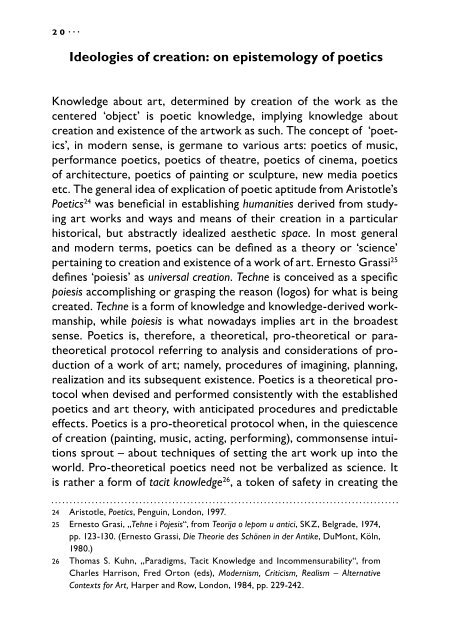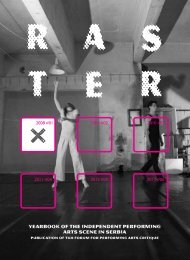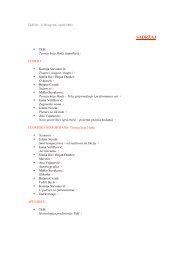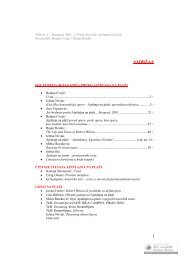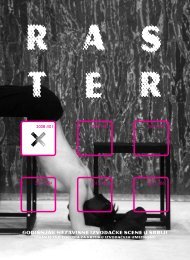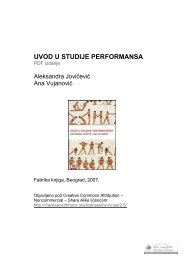Miško Šuvaković Epistemology of Art - TkH
Miško Šuvaković Epistemology of Art - TkH
Miško Šuvaković Epistemology of Art - TkH
Create successful ePaper yourself
Turn your PDF publications into a flip-book with our unique Google optimized e-Paper software.
20··· ··· 21<br />
Ideologies <strong>of</strong> creation: on epistemology <strong>of</strong> poetics<br />
Knowledge about art, determined by creation <strong>of</strong> the work as the<br />
centered ‘object’ is poetic knowledge, implying knowledge about<br />
creation and existence <strong>of</strong> the artwork as such. The concept <strong>of</strong> ‘poetics’,<br />
in modern sense, is germane to various arts: poetics <strong>of</strong> music,<br />
performance poetics, poetics <strong>of</strong> theatre, poetics <strong>of</strong> cinema, poetics<br />
<strong>of</strong> architecture, poetics <strong>of</strong> painting or sculpture, new media poetics<br />
etc. The general idea <strong>of</strong> explication <strong>of</strong> poetic aptitude from Aristotle’s<br />
Poetics 24 was beneficial in establishing humanities derived from studying<br />
art works and ways and means <strong>of</strong> their creation in a particular<br />
historical, but abstractly idealized aesthetic space. In most general<br />
and modern terms, poetics can be defined as a theory or ‘science’<br />
pertaining to creation and existence <strong>of</strong> a work <strong>of</strong> art. Ernesto Grassi 25<br />
defines ‘poiesis’ as universal creation. Techne is conceived as a specific<br />
poiesis accomplishing or grasping the reason (logos) for what is being<br />
created. Techne is a form <strong>of</strong> knowledge and knowledge-derived workmanship,<br />
while poiesis is what nowadays implies art in the broadest<br />
sense. Poetics is, therefore, a theoretical, pro-theoretical or paratheoretical<br />
protocol referring to analysis and considerations <strong>of</strong> production<br />
<strong>of</strong> a work <strong>of</strong> art; namely, procedures <strong>of</strong> imagining, planning,<br />
realization and its subsequent existence. Poetics is a theoretical protocol<br />
when devised and performed consistently with the established<br />
poetics and art theory, with anticipated procedures and predictable<br />
effects. Poetics is a pro-theoretical protocol when, in the quiescence<br />
<strong>of</strong> creation (painting, music, acting, performing), commonsense intuitions<br />
sprout – about techniques <strong>of</strong> setting the art work up into the<br />
world. Pro-theoretical poetics need not be verbalized as science. It<br />
is rather a form <strong>of</strong> tacit knowledge 26 , a token <strong>of</strong> safety in creating the<br />
24 Aristotle, Poetics, Penguin, London, 1997.<br />
25 Ernesto Grasi, „Tehne i Pojesis“, from Teorija o lepom u antici, SKZ, Belgrade, 1974,<br />
pp. 123-130. (Ernesto Grassi, Die Theorie des Schönen in der Antike, DuMont, Köln,<br />
1980.)<br />
26 Thomas S. Kuhn, „Paradigms, Tacit Knowledge and Incommensurability“, from<br />
Charles Harrison, Fred Orton (eds), Modernism, Criticism, Realism – Alternative<br />
Contexts for <strong>Art</strong>, Harper and Row, London, 1984, pp. 229-242.<br />
work <strong>of</strong> art as a sensible deed. Poetics is a para-theoretical protocol<br />
when formulated and performed inconsistently, when implying intuitive,<br />
anecdotal, biographical or empirical narratives about the artist,<br />
about the origins, existence or reception <strong>of</strong> his work. And, if poetics<br />
is rendered as a protocol for analysis <strong>of</strong> the origins and modes <strong>of</strong> existence<br />
<strong>of</strong> an art work, it is then, most commonly, also conceived as a<br />
prerequisite for sensuous aspects <strong>of</strong> the work – the aesthetic reception<br />
and aesthetic interpretation <strong>of</strong> the work <strong>of</strong> art. In other words,<br />
the protocols <strong>of</strong> poetics facilitate conception <strong>of</strong> the procedural, indeed<br />
conventional continuum between the creator, the act <strong>of</strong> creation,<br />
the work itself, reception <strong>of</strong> the work and contingent discourses<br />
about the work <strong>of</strong> art and ideas about art elicited from the work. If<br />
poetics is prerequisite for such a protocol for securing continuum <strong>of</strong><br />
‘art’ in particular or general terms, than art needs to be defined as an<br />
autonomous field in relation to the protocols <strong>of</strong> theology, politics, sociology,<br />
psychology, theory <strong>of</strong> sexuality or culture studies. Protocols<br />
<strong>of</strong> poetics determine contingencies <strong>of</strong> that supposedly ‘solitary’ and<br />
‘self-sufficient’ artworld, grounded in functions <strong>of</strong> the work <strong>of</strong> art as<br />
the ideal, centered origin <strong>of</strong> ‘artistic’ and ‘the arts’. While protocols<br />
<strong>of</strong> other humanities and art theories, e.g. psychology and sociology<br />
<strong>of</strong> art, feature as lateral, or oblique, or secondary assumptions and<br />
premises for determinable ideality or exceptionality <strong>of</strong> an art work<br />
created in accordance with expectations or re-interpretations foremostly<br />
pertaining to poetics – poetics itself is conceived as the primary<br />
and true condition <strong>of</strong> art humanities, indicating through its protocols,<br />
procedures, and effects, that the concept <strong>of</strong> art as a creative practice<br />
is grounded on descriptive renderings <strong>of</strong> autonomous works <strong>of</strong> art.


